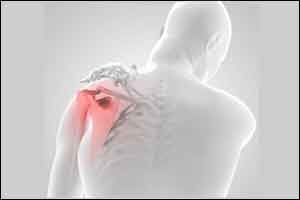- Home
- Editorial
- News
- Practice Guidelines
- Anesthesiology Guidelines
- Cancer Guidelines
- Cardiac Sciences Guidelines
- Critical Care Guidelines
- Dentistry Guidelines
- Dermatology Guidelines
- Diabetes and Endo Guidelines
- Diagnostics Guidelines
- ENT Guidelines
- Featured Practice Guidelines
- Gastroenterology Guidelines
- Geriatrics Guidelines
- Medicine Guidelines
- Nephrology Guidelines
- Neurosciences Guidelines
- Obs and Gynae Guidelines
- Ophthalmology Guidelines
- Orthopaedics Guidelines
- Paediatrics Guidelines
- Psychiatry Guidelines
- Pulmonology Guidelines
- Radiology Guidelines
- Surgery Guidelines
- Urology Guidelines
In Massive rotator cuff tear reverse shoulder replacement is treatment of choice in young

For younger patients with severe damage to the rotator cuff muscles, a "reverse" shoulder replacement provides a lasting improvement in shoulder function, according to a study in The Journal of Bone & Joint Surgery. The journal is published in partnership with Wolters Kluwer.
"In the absence of treatment alternatives, reverse total shoulder arthroplasty [RTSA] is a justifiable treatment for patients with a massive, irreparable rotator cuff tear before the age of 60," according to the report by Christian Gerber, MD, of the University of Zurich and colleagues. Despite a substantial risk of complications, most patients are satisfied with the outcomes of RTSA at follow-ups of a decade or longer.
Stable Long-Term Results of RTSA in Patients Younger than 60
The researchers analyzed the long-term outcomes of RTSA in 20 patients, average age 57 years. All had "massive, irreparable" tears of the rotator cuff muscles, causing shoulder "pseudoparalysis," with little no ability to lift the arm.
This group of patients typically gets limited benefit from shoulder replacement with conventional implants, which rely on the rotator cuff muscles to provide shoulder movement. The RTSA technique--using an implant in which the natural locations of the shoulder "ball and socket" are reversed--uses other muscles to move the shoulder, providing an alternative when the rotator cuff is severely damaged or destroyed.
When first introduced, RTSA was performed mainly in elderly patients who placed low demands on the shoulder. With refinements in technique and components in more recent years, the procedure has been used in younger, more active patients. But there are concerns about how well the results of RTSA will hold up over time in this group of patients.
The new study focused on long-term outcomes of RTSA in patients under age 60. The patients underwent follow-up examination between eight and 19 years after surgery (average 11.7 years). Three patients had RTSA in both shoulders, for a total of 23 procedures.
Compared to their preoperative status, most patients had substantial long-term improvement after RTSA. The average Constant score--a standard assessment accounting for shoulder motion, strength, daily activities, and pain--at the time of final-follow-up improved from 24 to 59 (out of a possible 100).
Patients' ratings of "subjective shoulder value" improved from 20 percent to 71 percent (compared to 100 percent for a normal shoulder). Shoulder movement and strength increased, while pain decreased. The improvement was similar for patients with and without prior shoulder surgery.
However, complications occurred in 39 percent of the shoulders. Further surgery was required in six shoulders; in two cases, the RTSA procedure was considered a failure.
When complications occurred, long-term shoulder functioning was not as good but even with the high complication rate, 72 percent of patients rated their satisfaction level as excellent or good.
The results alleviate concerns that the clinical benefits of RTSA might not hold up over time in younger, more active patients. Despite its high complication rate, Dr. Gerber and colleagues conclude that RTSA "provides substantial and lasting improvement" in shoulder function and pain, in a group of patients with limited treatment options.

Disclaimer: This site is primarily intended for healthcare professionals. Any content/information on this website does not replace the advice of medical and/or health professionals and should not be construed as medical/diagnostic advice/endorsement or prescription. Use of this site is subject to our terms of use, privacy policy, advertisement policy. © 2020 Minerva Medical Treatment Pvt Ltd